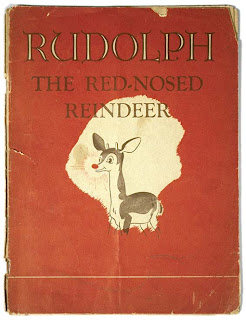"The Greatest Gift" is a short story by Philip Van Doren Stern about a man, by the name of George Pratt, who stands upon a bridge on Christmas Eve ready to commit suicide. It is there he meets a shabbily dressed, yet astute gentleman, and tells him that he wishes that he was never born. The gentleman says that he has got his wish and to go door to door as a brush salesman selling brushes. Everyone he meets does not know him. At his wife's house her husband shoos him away and when he goes to his childhood home he finds that his younger brother died in a drowning accident. He soon realizes that everyone he meets has been changed in a negative way because he was never born, so he returns to the bridge to wish that he had been born and that none of this ever happened. When he returns home to find his wife waiting for him, he embraces her and tells her that he is so happy that he never lost her. As he hugs her, he knocks a brush off the couch and realizes that the brush was one that he had given her earlier.
Sound familiar? Stern wrote the little story after a dream in the 1930s, but only printed 20 copies by 1943, passing out the copies to friends on Christmas. His story soon got out and RKO Productions' director showed it to Cary Grant who was interested in taking the lead and making it into a film. In 1945 Frank Capra bought the rights and adapted it into the movie we all know and love today "It's a Wonderful Life." Of course it was George Bailey in the movie instead of George Pratt, played by none other than Jimmy Stewart. And the man who visited him at the bridge was Clarence the angel who was trying to 'earn' his wings.
Showing posts with label Great Depression. Show all posts
Showing posts with label Great Depression. Show all posts
18 December 2011
09 December 2011
Day 10 of Christmas Nightlight Readings: Rudolph the Red-Nosed Reindeer
The year was 1939, the Great Depression continued, and the Montgomery Ward department store was feeling the economic stress. Every year at Christmas time, they had given coloring books out to children, but they decided that it would be cheaper and more efficient to make their own book. So they hired one of their copywriters, Robert L. May, to write a story that can be given to children as they visited Santa Claus. The story of the 9th reindeer, Rudolph, was born. This little retail gimmick turned into something bigger than they could have imagined. During the first year of publication, over two million copies were sold.
In 1947 a cartoon short based on the book was released, and ten years after the book was first published, a song written by May's brother-in-law Johnny Marks was sung by Gene Autry. The song became even more popular with the renditions of Bing Crosby and Burl Ives. The story has expanded to every generation with the Rankin/Bass stop motion movie made in 1964 (which is more based off of the Johnny Marks song than the actual book), which we all know and love (it will be on CBS tomorrow night at 8).
14 November 2011
Protests in the Past & Present
As we are all aware of the Occupy movement, I thought I would use this post as some seed for thought. In no way do I want this post to be a podium for my opinion or others. I just want to provoke some pondering...
My best friend and fellow blogger Golden Moments posted this link to this video:
The protests of the Great Depression are mentioned in this video. But I want to point out how different the Occupy movement is compared to the protests of the 1930s. As seen in this video are clips for these latter protests. It's a different breed. No need to say history repeats itself. America is continually revolving the Occupy demonstrations are for the most part peaceable comparatively, but from the foundation of America the right to protest and demonstrate are simply just part of our history. We may not all agree with the methods, but it is inherently part of being American.
My best friend and fellow blogger Golden Moments posted this link to this video:
The protests of the Great Depression are mentioned in this video. But I want to point out how different the Occupy movement is compared to the protests of the 1930s. As seen in this video are clips for these latter protests. It's a different breed. No need to say history repeats itself. America is continually revolving the Occupy demonstrations are for the most part peaceable comparatively, but from the foundation of America the right to protest and demonstrate are simply just part of our history. We may not all agree with the methods, but it is inherently part of being American.
Subscribe to:
Posts (Atom)
















